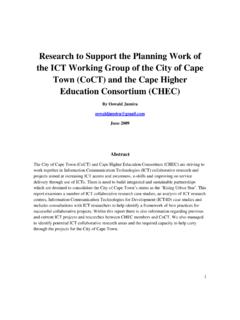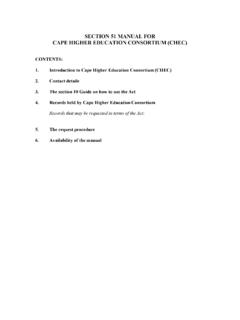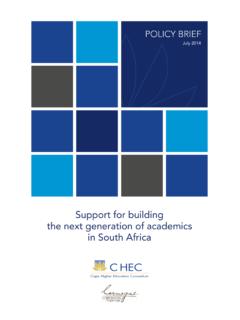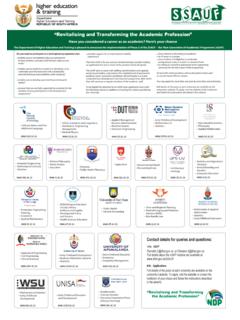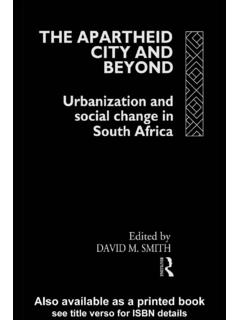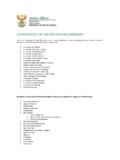Transcription of MEMORANDUM OF UNDERSTANDING - Cape …
1 MEMORANDUM OF UNDERSTANDING1. CONTEXT It is now widely accepted that accelerated economic growth is essential for South Africa s development, driving back poverty and inequality through job creation and improving the quality of life for the broad spectrum of the population. It is recognised that, in seeking accelerated economic growth, South Africa must expand and enable sectors with high levels of skills requirements and advanced expertise. South Africa faces a growing skills shortage both in people with graduate-level qualifications in key areas, and in skilled artisans. This imperative must also be addressed in tandem with efforts to create work opportunities for the unskilled and lowly- skilled (even if only temporary) through public works programmes and learnerships.
2 There is currently misalignment with South Africa s further, higher and continuing education sectors and market demand. This has resulted in the paradoxes of proposals to attract skilled foreign labour to a country with unacceptably high levels of unemployment, and the failure to fill graduate-level jobs in key sectors in the face of rising levels of overall graduate unemployment. In all highly developed economies, as well as countries with sustained high levels of economic growth, there are significant levels of national investment in higher education and associated research institutions, contributing an active research and development sector with effective knowledge transfers to the private sector and government.
3 Higher education institutions make significant contributions to democratic processes through fostering informed citizenship, critical debate and public intellectual life. Higher education in South Africa has gone through a sustained and highly disruptive process of institutional restructuring, and has yet to realise its full role in democratic life. Similarly, while policies for accelerated growth and social development are steered nationally and within the context of partnerships such as SADC and NEPAD, economic growth is constituted in provincial economies. In particular, provincial government policies, and their record of success in attracting investment, expanding and advancing the work- force, providing appropriate infrastructure and incentives and enabling improvements in the quality of life, give effect to or lead to the failure of national policies for economic growth, social development and environmental integrity.
4 However, there are currently no established structures that bring the Western cape higher education sector together with the Provincial Government to develop shared strategies for advancing social and economic development. This is in stark contrast to other parts of the world, where it has been shown that regional alliances that involve the higher education sector are an effective means of achieving economic growth, and for moving economies into higher skills levels. Critically, as the economy becomes more service- based, it is crucial to establish growth coalitions between regional governments, higher education institutions and the formal business sectors, that can also identify linkages with the informal economy to promote optimal job creation across the labour OBJECTIVES The primary objectives of the MEMORANDUM of UNDERSTANDING are to: establish structures that enable the Western cape higher education institutions and the Provincial Government to develop and implement shared strategies for advancing social and economic development.
5 Promote the Western cape as a Learning Region which can be used to attract people to the region to study and contribute to growth and development in the Western cape province; facilitate the regular sharing of information on the plans of higher education institutions and the Provincial Government; develop a three-year plan to address the mutually agreed strategic initiatives; and strengthen the contribution of higher education to the provincial economy. Hence this MEMORANDUM of UNDERSTANDING provides a framework for: facilitating alignment between the demand for scarce high-level skills in the medium to long term and the supply of graduates particularly in relation to identified growth areas; establishing strategic partnerships to support the provision of continuing education courses to address critical scarce skills shortages in the short term; reflecting on university/Provincial Government partnerships and for systematising and extending these best practices.
6 And guiding the nature of the collaboration between higher education institutions and the Provincial Government around agreed strategic PRINCIPLES The parties: respect the right of individual institutions to continue to enter into agreements with various provincial departments outside of the scope of this MEMORANDUM of UNDERSTANDING ; recognise that universities work at multiple levels, developing and promoting scholarship and enquiry internationally, across the African continent and in different regions of the country. Consequently, the higher education system is appropriately a national competence but universities make major contributions to regional economies as employers and consumers of services, constituting a major industry in their own right and therefore should be invited to participate in key provincial consultative structures related to human resource development.
7 Recognise that the Provincial Government has the mandate to develop strategic priorities and plans for the development of the province and that universities have the right to decide how to engage with these priorities within an accountability frame- work as publicly funded institutions; commit to undertake one or more collaborative projects in line with the objectives of the MEMORANDUM of UNDERSTANDING and to develop appropriate channels of communication and interaction to enable implementation of joint projects; and commit to pool or jointly secure resources to be managed by the collaborative structure to enable the implementation of jointly approved projects.
8 4. GOVERNANCE STRUCTURE Due to the challenges of convening meetings with the Vice-Chancellors of the universities and the provincial executive an annual forum will be convened to evaluate progress and review commitments for the following year. The dates for these forums will be set well in advance and become a feature of the annual calendar of the universities and the Provincial Government. 5. STRATEGIC COMMITMENTS Each annual forum will determine a programme of action for the following year which will constitute an Addendum to the MEMORANDUM of UNDERSTANDING . 6. IMPLEMENTATION OF THE MEMORANDUM OF UNDERSTANDING Task Groups will be established to oversee the implementation of agreements that may be concluded between the parties within the framework provided for by this MEMORANDUM of UNDERSTANDING .
9 7. COORDINATING COMMITTEE Each of the Task Groups will appoint two conveners to sit on a Coordinating Committee. The conveners will be drawn from the Provincial Government and the universities. The Coordinating Committee will meet at least once every three months. 8. SECRETARIAT The Secretariat will be appointed jointly by the CHEC Board and the Premier s Office. Both parties to this MEMORANDUM of UNDERSTANDING will support the Secretariat to give effect to this MEMORANDUM of UNDERSTANDING , Programmes of Action and pursuant agreements that may be concluded between the parties from time to INSTITUTIONAL LEVEL Each university will set up a structure/mechanism to liaise with the Provincial Government and support the implementation of the agreement.
10 Each institution will explore how the promotion systems and other incentives can be used to support regional engagement. The universities will undertake audits of institutional partnerships and share information on these audits with the Provincial Government. 10. IMPLEMENTATION AND MEASURING SUCCESS Each of the Task Groups will set concrete outcomes to be achieved over a three-year the cape Higher Education Consortium (CHEC) and the Provincial Government of the Western cape (PGWC)Signed at cape Town on this 16th day of October PityanaVice-ChancellorUniversity of South AfricaBrian O ConnellVice-ChancellorUniversity of theWestern CapeChris BrinkVice-ChancellorUniversity ofStellenboschVuyisa Lineo Mazwi-TangaVice-ChancellorCape Peninsula University of TechnologyNjabulo NdebeleVice-Chancellor University of cape TownEbrahim RasoolPremier.
